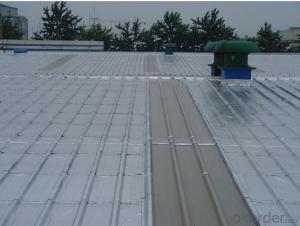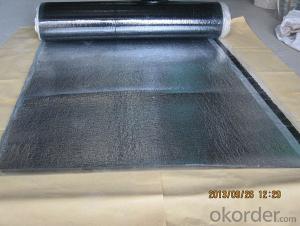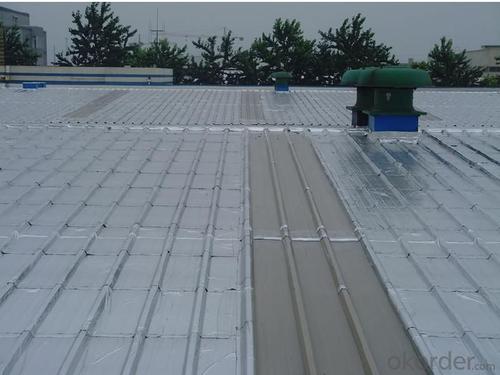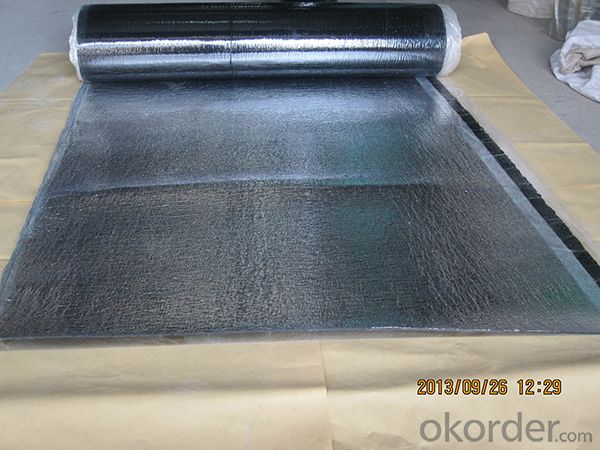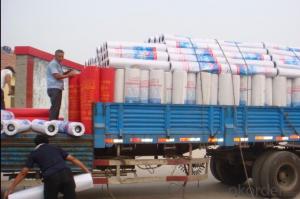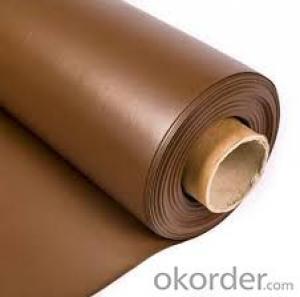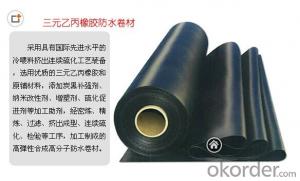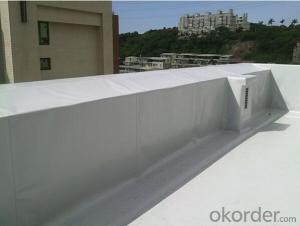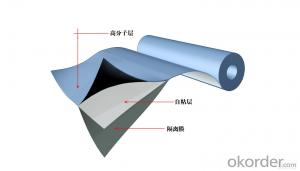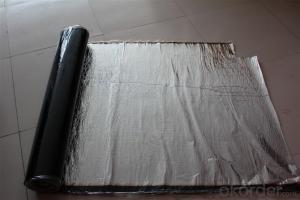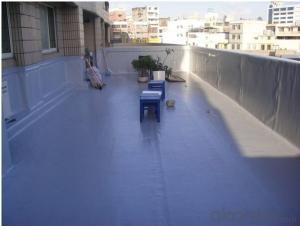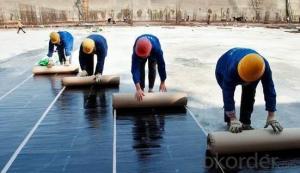Self Adhesive Waterproof Membrane Weather Resistant
- Loading Port:
- China main port
- Payment Terms:
- TT OR LC
- Min Order Qty:
- 5000 m²
- Supply Capability:
- 100000 m²/month
OKorder Service Pledge
OKorder Financial Service
You Might Also Like
Introduction
Weather resistant polyester self adhesive deck waterproofing membrane is produced with SBS elastomer and bitumen as raw materials, using polyethylene film.Aluminium foil coated on the upward or no file(both side self-adhesive) while self-adhesive protection layer on the downward surface.It has a widely prospect new contruction waterproof materials. Good self-adhesion, no leaking,cold flexibility,especially in self-adhesion. That is unque product in waterproof and application.
Specification
Thickness | 3mm, 4mm, 5mm |
Width | 1m |
length | 7.5m, 10m, 15m, or on demand |
Base | Polyester or Fiberglass felt |
Surface | PE film, Aluminum foil, Yellow sand, Shale gravel(Schist), colored sand |
Type | could self-adhesive |
Notice | SBS modified bitumen membrane is specially applied in the cold district, APP modified bitumen membrane is more suitable for hot district with high temperature. could be self-adhesive modified bitumen membrane |
Applications Scope
1) Widely used in the industrial and civil building roofing, underground, pool, tunnel, wooden and metal roofing.
2) Specially applied in the oil depot chemical factory, garment factory, and granary.
3) Especially used in cold places.
4) Tape used for sealing all construction material surfaces.
Advantages
1) Cold-applied construction with no open flame and self-adhesion without bonding agent make it safe, low- carbon, environmental, and economical.
2) Excellent adhesive performance guarantees the integrity of waterproof layer.
3) Good rubber elasticity, elongation and shear stress.
4) Good low-temperature property.
FAQ
1. Is sample available before place orders?
A: Yes, sample is ok.
2. How long is the dispatch period?
A: It will be around 20-30 days.
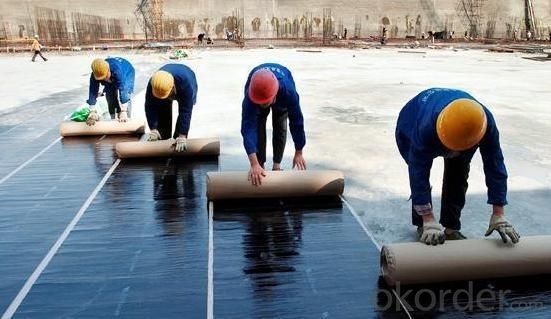
- Q: Can a waterproofing membrane be used in fountains or water features?
- Indeed, fountains and water features can benefit from the utilization of a waterproofing membrane. These specialized membranes are specifically crafted to safeguard surfaces against the infiltration of water, and their widespread adoption in construction projects, including fountains and water features, attests to their effectiveness. By establishing a formidable barrier, these membranes thwart any water seepage into the underlying structure, thereby guaranteeing the durability and operational functionality of the fountain or water feature. Furthermore, the versatility of waterproofing membranes is demonstrated by their compatibility with diverse materials such as concrete, stone, and metal, enabling their successful incorporation into a wide array of fountain designs and styles.
- Q: Can a waterproofing membrane be used for a parking garage deck?
- Yes, a waterproofing membrane can be used for a parking garage deck. Waterproofing membranes are commonly used in parking garages to protect the concrete structure from water damage caused by rain, snow, and other environmental factors. These membranes create a barrier that prevents water from penetrating the deck, helping to extend its lifespan and reduce maintenance costs.
- Q: What kind of waterproofing membrane, waterproofing membrane is how to classify their respective advantages?
- EPDM waterproofing membrane: Dura Pruff Germany imports, can be welded EPDM rubber waterproofing membrane, Wendi welding up to 470 ℃, can still be used after welding, support preform, material warranty 20 years And the welding tape is homogeneous with the material.
- Q: Can a waterproofing membrane be used in interior or exterior applications?
- Yes, a waterproofing membrane can be used in both interior and exterior applications. In interior applications, such as basements or bathrooms, a waterproofing membrane can be installed on walls or floors to prevent water or moisture from seeping through. This helps to protect the underlying structure from damage caused by water intrusion. In exterior applications, a waterproofing membrane can be applied to the exterior walls or foundations of a building to prevent water from penetrating into the structure. This is especially important in regions with heavy rainfall or high water tables. By creating a barrier against water, the membrane helps to keep the interior of the building dry and free from water damage. Overall, the use of a waterproofing membrane in both interior and exterior applications is essential for ensuring the longevity and durability of a structure by protecting it from water-related issues.
- Q: Can a waterproofing membrane be used for podium decks and plaza areas?
- Yes, a waterproofing membrane can be used for podium decks and plaza areas. Waterproofing membranes are commonly used in construction to prevent water penetration and protect structures from moisture damage. They are highly effective in providing a barrier against water and can be applied to various surfaces, including podium decks and plaza areas, to ensure their long-term durability and resistance to water-related issues such as leaks and deterioration.
- Q: Can a waterproofing membrane be used on interior walls?
- Yes, a waterproofing membrane can be used on interior walls to prevent water infiltration and moisture damage.
- Q: What should the attention of the membrane waterproof construction?
- (2) the construction of the membrane waterproof layer should generally be the lowest elevation from the level of parallel roof ridge construction, so that the coil according to the direction of flow lap, when the roof slope greater than 10%, the coil should be perpendicular to the direction of the roof paving;
- Q: Does a waterproofing membrane prevent efflorescence or mineral deposits on surfaces?
- Yes, a waterproofing membrane can help prevent efflorescence or mineral deposits on surfaces. The membrane acts as a barrier, preventing water from entering the surface and carrying dissolved minerals or salts that cause efflorescence. By keeping the surface dry, the membrane helps to minimize the formation of mineral deposits.
- Q: Can waterproofing membranes be painted over?
- Yes, waterproofing membranes can be painted over. However, it is important to use a paint that is compatible with the membrane material and to ensure that the membrane is clean and dry before painting. Additionally, it is advisable to consult the manufacturer's guidelines or seek professional advice to ensure proper adhesion and longevity of the painted surface.
- Q: Can a waterproofing membrane be used for wastewater facilities?
- Yes, a waterproofing membrane can be used for wastewater facilities. Waterproofing membranes are commonly used in wastewater facilities to prevent water leakage and seepage. They provide an effective barrier against water infiltration and protect the structure from water damage. Additionally, these membranes are resistant to chemicals and can withstand harsh environmental conditions often found in wastewater facilities.
Send your message to us
Self Adhesive Waterproof Membrane Weather Resistant
- Loading Port:
- China main port
- Payment Terms:
- TT OR LC
- Min Order Qty:
- 5000 m²
- Supply Capability:
- 100000 m²/month
OKorder Service Pledge
OKorder Financial Service
Similar products
Hot products
Hot Searches
Related keywords
